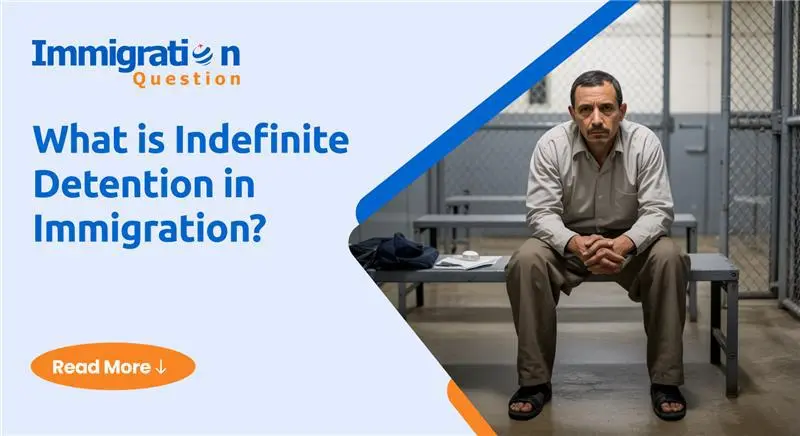If you or someone close to you is being held by immigration authorities for months—or even years—without a clear end in sight, you may be facing something called indefinite detention. It’s a painful, confusing, and frustrating situation that affects thousands of immigrants every year in the U.S.
In this guide, we’ll answer the frequently asked questions about Indefinite Detention, breaking down what it means, why it happens, and how an experienced immigration lawyer can help you take action.
Q: What Is Indefinite Detention?
A: Indefinite detention happens when the U.S. government holds a person in immigration detention for an extended period without deporting or releasing them. There is no deadline. Some spend months. Others, years.
In most cases, the person already has a final removal order but cannot be deported. Why? Because their country of origin does not want to take them back or because there are still pending legal issues being addressed.
The most critical circumstances where this happens are:
- The immigrant has no country that will provide travel documents
- Pending legal issues in immigration court
- The person is deemed a threat to the public or national security
- Deportation has been delayed because of foreign diplomacy issues or crises
This kind of prolonged detention will often violate fundamental human rights, especially when there seems to be no solution at hand.
Q: Why Does Indefinite Detention Happen?
A: While immigration law allows ICE (Immigration and Customs Enforcement) to detain people under certain conditions, things do not always go as planned. Many detainees get caught in a legal limbo that keeps them from being released or deported.
Typical reasons for indefinite detention:
- Stateless individuals with no country of citizenship
- Nations that refuse to cooperate or issue travel documents
- Motions to reopen cases pending or appeals
- Public safety or criminal record concerns
- Court backlogs delaying hearings and decisions
Even when the law stipulates that a person is to be released after a specific period, the government’s lack of oversight can leave them in limbo for far too long.
Q: What Are the Legal Limits on Detention?
A: In Zadvydas v. Davis (2001), the Supreme Court ruled that immigrants generally may not be detained for longer than six months after a removal order became final—except where deportation is likely to occur shortly.
Here’s what it means:
- ICE must deport the person within 90 days of a final order.
- The person should be released after 180 days if there is no reasonable probability of deportation.
- ICE must conduct custody reviews and justify extended detention.
There are exceptions, however. Those with serious criminal backgrounds or national security threats may be held longer, but even so, the government must review the case regularly.
However, in practice, many are held much longer than these restrictions due to system failures or abuse of discretion.
Q: How Does Indefinite Detention Impact Families?
A: Indefinite detention causes severe damage to families. They are usually left in a position of financial and emotional devastation with no clue when—or if—their loved one will ever be released.
These are just some of how indefinite detention affects families:
- Emotional trauma from being separated, especially for children
- Financial loss when the family breadwinner is detained
- Uncertainty about the law and lack of information from authorities
- Mental illness issues for the detained person
- Overdue milestones like birthdays, graduations, and holidays
The uncertainty is devastating. And for detainees, the psychological harm is typically worse. Stuck with no solutions can bring anxiety, depression, and despair.
Q: How Can You Challenge Indefinite Detention?
A: You’re not out of luck. With the help of an experienced immigration attorney, you can challenge prolonged detention and pursue release.
Here are a few options:
- Habeas Corpus Petition: Strong legal recourse used in federal court to challenge unlawful detention.
- ICE Custody Reviews: Detainee can petition for review every 90–180 days and beg for release.
- Motion to Reopen or Reconsider: Especially if new evidence is presented.
- Parole or Bond Requests: Depending on the individual’s background and degree of risk.
- Filing Appeals: If a case was unfairly rejected, an appeal can stop removal and justify release.
In all cases, legal guidance is crucial. Immigration law is complicated, and going it alone makes success much harder.
Q: How Can an Immigration Attorney Help?
A: If someone is detained indefinitely, an immigration attorney can be your biggest ally. They know the legal system and understand what arguments ICE or a judge will listen to.
Here’s how an immigration attorney can support your case:
- File petitions for bond or release
- Prepare supporting evidence, such as country condition reports
- Advocate on your behalf in immigration court
- Challenge unconstitutional detention in federal court
- Provide guidance to families on steps they can take from outside
With the help of an attorney, you can move from detention to freedom—and have a real chance to stay in the U.S. legally.
Other FAQs
Q: How long can ICE hold someone with no criminal record?
A: Generally, ICE can hold a person for no more than 90 days after a final removal order. After 180 days, if removal is not likely, extended detention can be challenged—specifically if there is no criminal history.
Q: Can detainees petition for bond release?
A: Yes, but not everyone. Some individuals with serious criminal histories or considered flight risks will not qualify. A judge reviews each application.
Q: What if my home nation won’t take me back?
A: If there is no reasonable chance of deportation soon, ICE must release you after six months. You may have to appeal for habeas corpus to enforce that right.
Final Thoughts
Indefinite detention is not a legal issue—it’s a human one. It separates families, causes difficult mental suffering, and raises serious constitutional issues. But you don’t have to endure it alone.
If you or someone you know is experiencing indefinite detention, speak with an immigration lawyer immediately. They can help you fight for freedom, challenge unjust custody, and pursue other immigration relief.
Visit Immigration Question to connect with experienced immigration attorneys who know how to protect your rights—and your future.











